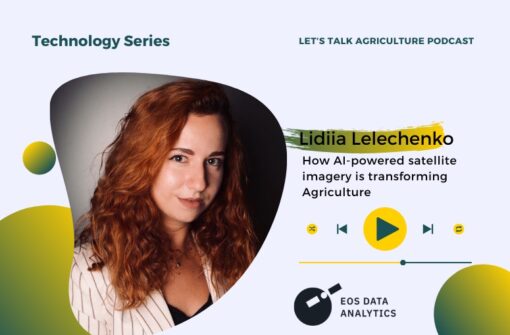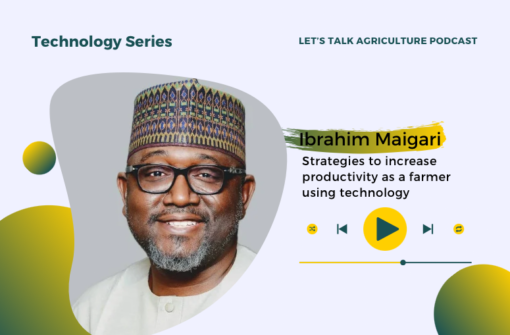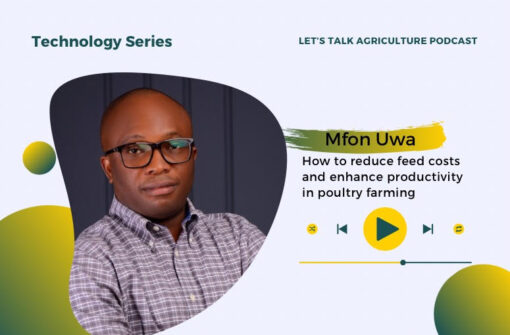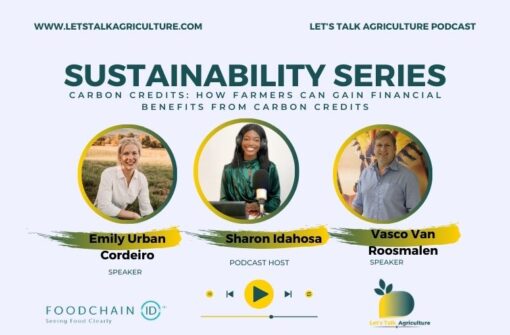Welcome to the first episode of our sustainability series where we explore innovative solutions and practices that contribute to a more sustainable future.
In this episode, our podcast host Sharon Idahosa had a seat with Yemisi Iranloye to discuss the sustainable solutions in cassava processing which was an eye-opener because Yemisi shared insights about the cassava value chain.
Transcript
Sharon Idahosa
Hello, beautiful people. Welcome to the Let’s Talk Agriculture podcast show. The podcast that connects you with the happenings, Trends and opportunities in the agriculture sector. My name is Sharon Idahosa, and I am your host. If this is your first time learning about Let’s Talk Agriculture, we are an industry specific public relations and communications firm helping agriculture businesses build their brands, increase awareness and establish leadership in their areas of specialization.
Now if this interests you, then do well to visit letstalkagriculture. com or send an email to hello@letstalkagriculture.com for more information. And now, welcome to our sustainability series where we explore innovative solutions. in practices that contributes to a more sustainable future. This episode is sponsored by Psaltry International, the leading Agro allied cassava processing company in Africa.
So in today’s episode, we are super thrilled to have Yemisi. The founder of a Cassava processing company joining us now. I mean, this woman is an amazing woman. I mean, I’ve seen so many things that she has been doing so far, and I can tell you that she is worth celebrating. Thank God. We are still in the month to celebrate women.
So this is my chance to say, I mean, you’re doing amazing. So thank you so much for joining this show. Yemisi’s company produces cassava based Sorbitol; a versatile raw material used in food and beverage production toothpaste production, confectionery, just name it. So we will dive into how her company is driving sustainability through cassava processing.
Thank you so much for joining the show today. How are you doing?
Yemisi Iranloye
I’m very well. Thank you, Sharon. How are you too?
Sharon Idahosa
Well, I’m doing okay. I’m doing okay. Getting ready to take a leave very soon. I’m going to share why I’m taking the leave. Hopefully, hopefully I wouldn’t. Okay.
Yemisi Iranloye
Well deserved. Is that sorry? I said well deserved.
Sharon Idahosa
Ah, yes, well deserved leave.
Yemisi Iranloye
I mean well deserved leave.
Sharon Idahosa
Yeah. I’m waiting for it. I hope everything is going well with your business?
Yemisi Iranloye
We’re doing well, we thank God. Though the the economy is a bit harsh but we’re doing our best.
Sharon Idahosa
I can imagine. I can imagine. Our last episode, we were talking about the currency fluctuations and how it’s affecting farmers and then the commodity market.
So I understand how all of this is playing a major role for producers or farmers. Ah, well, I only wish that things would get better, to be honest. I wish that this would just take shape and help us get back on our feet once again.
Yemisi Iranloye
Yeah!
Sharon Idahosa
Okay. So to get this episode rolling, can you share with our listeners how your company your cassava based Sorbitol contributes to a more sustainable approach in the agricultural sector?
Yemisi Iranloye
Okay. Thank you very much for that question. Our Sorbitol is produced from cassava and cassava is a tuber. largely grown by Nigerians by Nigerian farmers. We are located at Oyo State in a village called Alayide Village. We work with about 10, 000 farmers, out of which about 45 percent are women, another 20 percent are men, are youths, and then the rest are men above 15.
The structure we have created is such that the farmers bring their produce to the factory, the farmers are assisted, by the way, to cut, and they bring to us, and we are able to use it to produce Sorbitol, which is in eventually goes in for oral care production, or production of oral care, and also for the farmer use.
So. We, we, we are very innovative. We use raw material that is now, that is cassava, and that’s how we have been able to use agriculture to innovate the production of sorbitol.
Sharon Idahosa
Well, that’s an exciting development. So to be honest, let me just be really honest right now. I never knew that something like this really exists.
So when I eventually got to learn about you, I said, Maybe I should definitely get you on the paodcast, but that was like last year. And I’m glad that we are having this podcast now, because it’s going to help me to, you know, learn more about the cassava value chain and what can be. Can be done with it. I mean, so many young people do not know how to leverage some of these opportunities.
And I’m really excited that you’re on this podcast to share what you’re doing with Cassava. So I’m sure that young people would definitely benefit from this episode. So thank you once again for joining and your willingness to share more about your company and how you will intervene the agricultural sector.
So I believe that you are a major player, of course, in the cassava value chain. What sustainability challenges have you faced in the cassava processing industry? And how have you overcome them? I’m really interested to know.
Yemisi Iranloye
Okay. The major, major challenge that we face in the cassava processing industry is raw material.
You just don’t have enough because cassava is a root tuber crop. In the rainy season, it’s easy for you to bring out the roots. But in the dry season, when the ground is really hard, you have to bring it out with a lot of difficulty. In fact, you have to use hoe to be able to dig it out.
There are no mechanized, very adequate efficient, let me use the word efficient. There are not yet efficient machines to mechanize the harvesting of cassava, and that’s a major setback So during the rainy season is easy to bring it out manually in the dry season is a bit difficult So the volume that comes out is lower.
It shoots up the increase in price Okay, so you have an increase in price because of the fact that the ground is hard. So this is the major challenge that other processors that are using cassava as raw material are producing. So we are challenging institutes in engineering institute to help us design equipment that will effectively bring out cassava from the soil that we can use to harvest it.
Now, there are a number of equipment that are available, but they are not efficient. They cut the roots into two. Some of them harvest half and do not harvest half. Some of them cannot even penetrate. When the tubers are big, they can’t go down to bring it out. They cut the tubers into two. So those are the challenges that we have so far, processing cassava, especially with roots harvesting and delivery.
Sharon Idahosa
Well, that’s a major call to action if you ask me. I mean, this is something that we should be putting out because I can imagine the, the amount of. labor that goes into trying to dig out cassava during the dry season.
So this is more like a call to action to the government, to engineering companies, like you mentioned, to get them involved, maybe make them see that this is a major challenge in this sector, in the cassava processing industry for them to really get involved and see how to go about providing this equipment needed.
So yeah, I do think that we should put this out as a call to action to get, to create awareness around it. I’m not sure if this is already going on, or if you know anybody that is already pushing something out like this, because I’m sure we have so many cassava processors that use raw materials.
So maybe this is a good way to put together, drag everyone together to say, Hey, let’s, let’s push this out. Let’s make this a call to action for people to, you know, get involved in the cassava processing industry, making the machines that we need. I don’t know what your thoughts are on this.
Yemisi Iranloye
Yes. I think, you know, a grant, provide a grant for anyone who can design a machine that can bring cassava out without breaking it.
So yes, it’s something we have to do.
Sharon Idhaosa
Well, I think this would be pretty much exciting to be more like an exciting competition. If you ask me, I mean, you definitely see lots of young people because we have young people that are brilliant and can really pull out something amazing like this. You know, every time we hear people say, we hear them say agriculture is not attractive.
But this is, this is an avenue to let them know that. Yes, agriculture can really be attractive. They can really get involved. It doesn’t really mean they have to be on the farm. So all they have to do is bring in their creativity, as well as their skills to produce things like this, to make things like this.
So if we can actually really, really, really push out such competition, I’m sure that we’ll definitely see young people who will be very thrilled. to get involved and do something like this. So please just let me know whenever something is planned out already so that I can definitely participate, collaborate to push out that initiative.
So thank you so much for pushing this out. I’m excited for what’s to come and please do well to share with me again, please.
Yemisi Iranloye
Okay.
Sharon Idahosa
Okay. Thank you once again for sharing that. I was wondering if you could just elaborate on some of the environmental benefits of using cassava based sorbitol.
Yemisi Iranloye
Okay cassava based sorbitol is gluten free. Most of the other sorbitol are produced from corn, sorghum, they all have most of them have gluten but this is gluten free because cassava is gluten free, and sorbitol, obviously, it’s low calorie. So it’s when used in pastries or baking, it does, it’s more healthy because of the calorie that is low.
So I think the major advantage is that it is gluten free and it is low calorie.
Sharon Idahosa
Okay. for sharing that with us. for sharing that with us. But how do you really just incorporate innovation, technology into your cassava processing operations? I mean, we’re in the world of technology now and so many innovative solutions are coming into the picture.
So I’m just trying to know how you incorporate these innovative technologies into your operations.
Yemisi Iranloye
Yeah. In the first place, a lot of technology was put together to be able to get it to the stage of producing Sorbitol. So it’s, it’s all a lot of innovation. And most of it, being the first in Africa to use Cassava, we have to innovate a lot of things.
We have to learn from the process. You understand, because you don’t have anyone to copy. So we have to learn from the process. We spent a lot of time to be able to achieve what we achieved. So what we did was to ensure we have equipment. We have analyzing equipment like HPLC, chromatography, gas chromatography, spectrophotometer, calf fissure.
We have all those equipment to be able to test and design the equipment. So innovation was easier for us because we have equipment to, to tweak the products. We have equipment to give us results, which we use to tweak the products.
Sharon Idahosa
All right. That’s pretty exciting. I mean, imagine being the first to set up a company, be the first to set up something different.
I mean, that must have been a lot of work for you, but well done, actually. I mean, it’s not easy to set up something like this when there is no road map to follow, I mean, you just have to be creative on your own. So yeah, I think you’ve done an amazing job and I would definitely love to see more and learn more about your business and what you do in Nigeria and Africa.
Yemisi Iranloye
Yeah, thank you.
Sharon Idahosa
So finally, just, can you just maybe discuss any partnerships or collaborations your company has engaged to, you know promote sustainability in the cassava processing industry?
Yemisi Iranloye
Yeah, we have a lot of collaborations with different agencies. For example, we collaborate with IITA in the agronomy aspect to get new varieties and to get new varieties and new stem varieties.
We collaborate with agencies like CAVA. Okay, we collaborate with even Sterling Bank on our biogas. Projects where we use all our waste to generate biogas and use the biogas to generate steam.
We presently are collaborating with Star, Star Star Industry. They have a power supplying industry. They are supposed to supply us power. So we collaborate with a lot of organizations, AGRA, AGRA to help us with a farmer or help us with funding to help us to get our farmers grant. We also do a lot of collaboration with different agencies, so you can’t succeed alone in this kind of big projects or big business. We need to collaborate with international agencies and we do have close to 15 thereabout different agencies that we partner with on different projects.
Sharon Idahosa
Well, indeed, you can actually just walk alone in this big industry. I mean, if you want to run a successful business, you have to look out for partnerships, because that will really drive growth for you as well.
So I’m glad that you have all of these partners. working with you to ensure that you thrive in this industry. I’m really excited about what you’re doing and I am super excited again to know that your major workforce contributes consists of women who are major contributors, of course, to the agriculture industry.
So I wanted to just quickly mention this thing. Maybe just maybe you are having trainings or something for for women to get involved because you know not so many are aware about this, just like you mentioned this. company is the first in Africa to do something like this. So I think it would really be amazing to have more women, more youths who would learn more about this, maybe like a training for something to get them involved, make them see opportunities in the Cassava Valley chain out to tap in and really how to just get involved.
So I don’t know what your thoughts are when you’re putting up programs like this that can be beneficial to women and young people out there.
Yemisi Iranloye
Okay, yes, we, in our, in our family community, we are deliberate about adding women to our family community. In fact, we do our indoor program which favors women more because we give them land and then we also have hostels on the farm where the women can relax and even have their children play while they’re on the farm.
So yes we, women are key. So the women folks are key in our strategic development plan. And we. Take the number, the indices very seriously. At no point do we have less than 45 to 50 percent women in our total family community.
Sharon Idahosa
Well, that’s exciting to know. I always want to make sure that women are actively involved and are getting the most.
Out of everything we are doing. So I’m glad that you set this up and if you ever need my help to, you know, push out some of your initiatives and how to get women involved, please do well to reach out to me, I’m open to exploring that. collaboration to get more people to know about this and how they can tap into it.
So I’m glad once again that we are having this session so that we can really push this out for people to know something like this exists. And of course, there is there’s, there’s benefits when we decide to venture into the Cassava Valley chain. So once again, thank you so much for joining today’s episode.
I really appreciate you coming to share your thoughts, coming to share what you do at your company and how you’re actively engaging women. Who are very keen and, you know, important to me. I don’t want to sound so gender biased right now, but I mean, I’m a woman myself and I am very particular about women.
So please pardon me, everybody. I am very particular about women. I mean, my company, myself, I mean, we, we are, I run a, a, A public relations firm, right? And I’m a woman as well. And the team is basically comprised of women as well. So, so yeah, I’m very particular about women and making sure that they get what they deserve.
I mean, so many challenges that we may face, but I’m glad that women are coming out and doing what they are supposed to do, taking up leadership roles. So seeing you as a leader. Engaging more women. It is actually very commendable and I’m excited to see more of what you’re going to do. And I’m willing to go on this journey with you as well, pushing out your initiatives.
So thank you so much once again for joining the show today.
Yemisi Iranloye
Thank you very much. My pleasure. And thank you for having me.
Sharon Idahosa
Yes, of course. It’s indeed a pleasure. So guys, we have come to the end of today’s episode. I hope you learned something from this episode. This is an opportunity. So like I always mention, Let’s Talk Agriculture podcast is for you to get insights to, you know, the happenings, the opportunities in the agricultural sector.
And I wouldn’t fail to bring opportunities your way. And this is just one of them. So do well to explore and see ways you can tap into the cassava value chain industry, the cassava processing industry. There’s so much opportunities for you. And of course, if you’d like to connect with our guests, I’m sure she’ll be excited to connect with you if you’re a woman, if you’re a youth.
And of course a man as well. So yes, I’m sure she’s excited to connect with you and maybe I’ll get in touch with her later to see how to how you can reach us so we can always attach that to national notes. I’m really excited about this and I hope you are too. So guys do well to subscribe, do well to follow and do well to share this episode.
So many people. definitely going to benefit from this episode. So don’t just keep it to yourself. Okay. Thank you so much, guys. Do have a lovely time. Once again, my name is Sharon Idahosa, and I am the host of the Let’s Talk Agriculture podcast show. Thank you so much, guys. Have a lovely time. Bye. Bye.
Yemisi Iranloye
Bye.
End of Transcription
This Episode is sponsored by Psaltry International.
About Psaltry International
Psaltry International Company Limited is the leading agro-allied cassava processing company in Africa. We are the first cassava processing company in Africa to produce cassava-based sorbitol and the second in the world.
The company was established in 2005 to enhance the cassava value chain by defining a new approach to cassava processing. That enables a consistent supply of high-quality industrial cassava derivatives, including high-quality cassava flour (HCCF), high-quality food-grade cassava starch, and sorbitol to our clients in the pharmaceutical, personal care, food, and beverages sectors.

Learn more. ..
For podcast advertising and sponsorship, download our media kit here.




